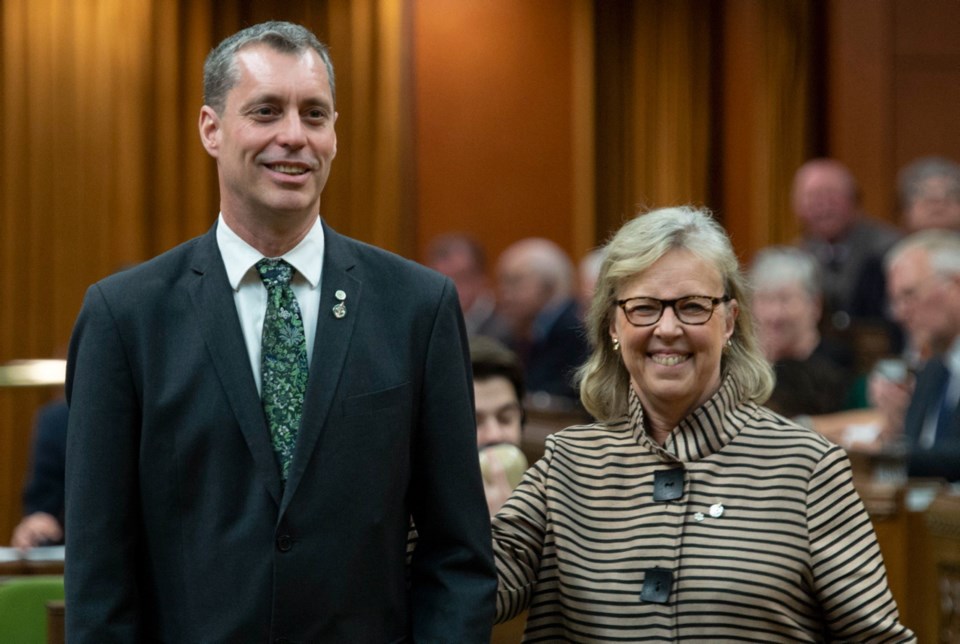Would-be candidates are flocking to the Green Party of Canada at an astonishing rate in B.C., bucking a historical trend identified in a new study from the Samara Centre for Democracy.
Nearly half of 34 federal Green riding associations that have completed the nomination process in B.C. ran contested races. The Cowichan-Malahat-Langford nomination is being sought by no fewer than eight applicants, the party said.
Both sitting MPs — Elizabeth May and Paul Manly — ran uncontested, bringing the Greens candidate total to 36 for the 42 ridings in B.C.
With six riding associations left to choose a candidate, the Greens could easily have more than 50 per cent of their nominations contested if more than one candidate applies in each of those ridings.
Hotly contested nominations are historically uncommon in Canada. Just 17 per cent of 6,600 candidates who ran in the past five federal elections won a competitive nomination race, according to the Samara study.
More than 2,700 were appointed by the parties with no nomination process and 70 per cent of nominations were by acclamation.
Local nomination contests are considered foundational to the democratic process, the moment when parties are most accessible to their grassroots supporters, the study suggests. Free, consistent and transparent nomination processes are fundamental to voter engagement, while the practice of appointing insiders to run for office might be an obstacle to diversity in the candidate pool and create distrust among voters.
To get a sense of how the nomination process is playing out in B.C., the Vancouver Sun asked the five main parties about their candidate selections.
The Liberal Party has nominated 216 candidates so far for 338 ridings across Canada, including 27 of 42 in B.C., the party said in a statement. It did not reveal how many nominations were uncontested.
But it said more than 500 candidates have applied for nomination in the 122 ridings left to choose a candidate, “a bigger pool of prospective candidates than we’ve ever had.”
The party has new standards for electoral district associations, which must document “a thorough search for potential women candidates and other candidates who reflect the demographics of the community.”
“So far, 57 per cent of all new Liberal candidates are women, and the combined total for women candidates so far is 36 per cent,” the party said.
The Liberals hold just 11 seats in Alberta, Saskatchewan and Manitoba combined, and the party has yet to nominate candidates in 28 of Alberta’s 34 ridings.
The New Democrats have nominated candidates in 26 ridings in B.C, only six of which were contested. Nine of the candidates are incumbents and ran for nomination unopposed, though party rules do allow sitting MPs to be challenged.
“We are proud of the fact that over 20 per cent of our 26 nomination races in B.C. have been competitive,” the party said in a statement.
“Five other nomination meetings are scheduled before the end of the month so far. While it’s impossible to know how many of these races will be contested because there is still time for candidates to enter or drop out of the contests, we expect some of them to be competitive.”
Of the major national parties, the NDP trails with just 116 candidates nominated Canada-wide.
The People’s Party of Canada has nominated candidates in all 42 B.C constituencies and said most involved nomination races.
The Conservative Party of Canada did not respond to questions about contested nominations from the newspaper, but they lead the major parties with 316 candidates already in place. The party has 30 candidates nominated in British Columbia.
Candidates for nomination describe the nomination process as harrowing and full of interference from party brass, according to exit interviews conducted by Samara over the past 12 years.
“I think the process is fundamentally flawed and I’m concerned it is systemic through all the parties,” said Lars Guignard, a recent candidate for Green Party nomination in West Vancouver-Sunshine Coast-Sea to Sky Country.
With more than 80 per cent of candidates being either appointed or running uncontested, ordinary people have concluded that the process is rigged, he said.
“I absolutely believe that nominations are a top-down process to keep the political machine running the way they want it to run and I think we need to save democracy from this,” he said.
While recent surveys have the Greens polling about 10 per cent across the country, they have more than twice that level of support in B.C. and stand to increase their seat count. An analysis of recent polls by 338Canada suggests the Greens could win at least five seats in the next federal election.
May is the only party leader with a positive score when people were asked whether they view federal leaders favourably or unfavourably, according to the Angus Reid Institute.
It all adds up to a potential breakthrough, especially if British Columbians vote based on their runaway top concern identified by Angus Reid, environment and climate change.



